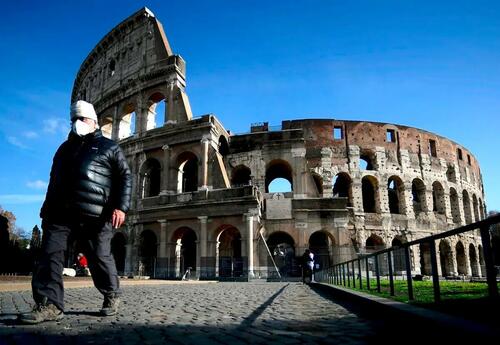Authored by Nicole James via The Epoch Times,
Democracy, that ever-so-fleeting fancy, has a tendency to tumble into a bit of a tizz before it topples over, panting and gasping like a winded walrus.
John Adams, ever the prophet of doom, once quipped, “Democracy never lasts long. It soon wastes, exhausts and murders itself”—a sentiment echoing through the corridors of time.
And sounding much like the belch of a senator post-banquet in ancient Rome, where democracy was more a concept for philosophical banter than a practice.
Indeed, Rome, with all its pomp and voracious appetite for self-indulgence, serves as a cautionary tale. It’s a well-trodden path.
Once upon a time in Rome, there was Juvenal. Not your garden-variety naysayer, but a man whose tongue was so sharp, he could slice the moral fabric of society with a mere quip.
“Bread and circuses,” he scoffed.
“Keep the masses stuffed and entertained, and they won’t utter a peep against you.”
How a Great Empire Withered on Opulence
And so, Rome bloated, not just in the midriff but in its sense of self, as leisure became the national pastime.
Back then, over 200,000 souls, their fingers sticky from pastry, found the concept of lifting a finger (unless it was to signal for another helping) utterly foreign.
Rome was transformed into a grand stage, where almost every day was a festival, and the citizens were either performers, spectators, or busy in the vomitorium making room for the next course.
Naval skirmishes in makeshift lakes, chariot races that put the fast and furious to shame, and theatre so risqué it could make a statue of Venus look prudish, were all funded by the very people it was designed to distract.
Ninety-three days of sheer, unadulterated spectacle each year, turning Rome from a republic into an extravagant production, where democracy was but a whisper drowned out by the roar of the crowd.
Sound familiar?
A face-masked man walks by the ancient Colosseum in downtown Rome on Dec. 5, 2020. (Filippo Monteforte/AFP via Getty Images)
As the mighty arm of the empire began to resemble less of a fearsome gladiator and more of a feeble old man waving a stick at rambunctious youths, the calendar started to look like a mushroom farm after a spring shower, each new holiday popping up to toast to victories most had forgotten the taste of.
Seems positively contemporary, what with the world running out of calendar days and having to celebrate Easter Sunday on Trans Awareness Day, an event that surely had the ancients rolling in their extravagantly decorated sarcophagi, perplexed by the modern conundrum of “calendar overcrowding.”
Emperors, those illustrious leaders of men, were reduced to headline acts in this comedic opera, plastering on smiles and feigning a zeal for the games that could rival a wet sponge’s enthusiasm for a desert trek.
In this farce, the once hallowed ceremonies now resembled a confused shuffle of days, where the only thing more bewildering than the holidays themselves was the populace’s ability to keep track of what they were celebrating.
Gone were the days of the iron-fisted rule of Julius Caesar or the cunning Augustus. Now, the sceptre was in the shaky grasp of the likes of Commodus and Septimius Severus, whose reigns were as inspiring as a flat ale on a hot day.
Leadership, once a robust wine, had become a watery vinegar, with emperors inflating their egos and coffers, whipping up the populace into a frenzy with what amounted to little more than patriotic chest-beating and flag-waving.
(Africa Studio/Shutterstock)
The spectacles, meanwhile, morphed into a grotesque parade of the bizarre and the barbaric, a stark contrast to the fading reality of employment and land ownership—those became the stuff of fairy tales.
Even the steadfast Marcus Aurelius watched helplessly as the empire’s coinage became as flimsy as modern promises of fiscal restraint, shrinking in both size and worth.
Bread and Circuses of the Present
Leap forward to the present, and the circus hasn’t so much as ended as it has swapped costumes.
Today’s coliseum is filled with Drag Time Story Hours and a calendar so crammed with celebrations of every stripe of pride and culture that one might need a guide to navigate it.
Subsidies shower down like the finale of a firework show, ensuring the populace remains too stuffed on the bread and dazzled by the circus of reality TV outrages and viral sensations to notice the ground shifting beneath their feet.
In this grand festival of the now, one has to wonder if we’ve become spectators in our own version of Rome’s downfall, squinting at the bright lights, too entertained to notice we’re perched on the edge of history’s greatest pratfall.
Will the grand banquet of our times end in a burp of regret?
* * *
Views expressed in this article are opinions of the author and do not necessarily reflect the views of The Epoch Times or ZeroHedge.


